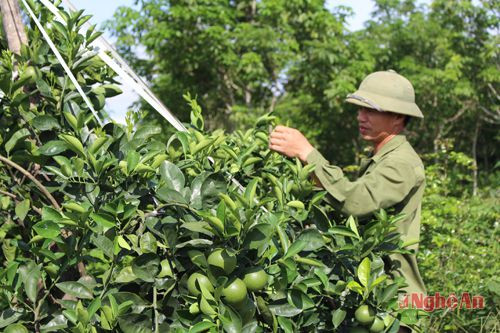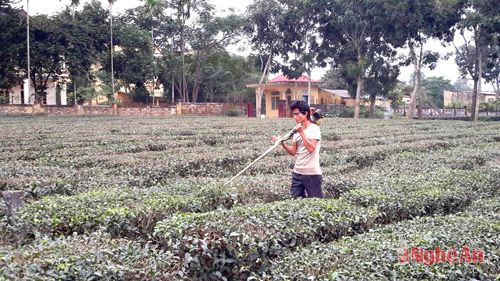Reorganizing and innovating agricultural enterprises: Final article: Clearly defining the roadmap and development strategy after transformation
(Baonghean) - Reorganizing and equitizing agricultural enterprises is an inevitable requirement; this process is determined to be difficult because of the problems associated with means of production, a large number of workers, and most of all, land reclaimed by workers for production decades ago... Land recovery, resolving surplus labor, and finding a new direction for agricultural enterprises must therefore have a specific and appropriate roadmap, while ensuring production planning in the area.
| RELATED NEWS |
|---|
Faced with the policy of equitization and restructuring of enterprises, many units have thoughts. They only have 4 choices according to Resolution No. 30/NQ/T.U and Decree 118/ND-CP: one is to continue to consolidate the enterprise; two is to equitize; three is to establish a 2-member LLC; four is to dissolve. Once an enterprise that "opened up the land", the workers who were young men and women in their youth are now old, giving up the land to their children to do business, continuing to receive contracts and produce to contribute to the efficiency of the enterprise. The salaries of direct workers of the units are paid by the "land" and the "garden", but between them and the enterprises there are still close, intimate ties...
 |
| Taking care of oranges at Xuan Thanh Company Limited (Quy Hop). Photo: Phu Huong |
Faced with the need to reorganize the unit, Xuan Thanh Agricultural One Member Co., Ltd. (Quy Hop), with the advice and evaluation of the criteria from superiors, decided to choose the form of establishing a 2-member LLC. Mr. Hoang Van Minh, Director of the company, said: To maintain efficiency after the reorganization, the company has searched for partners for joint ventures and associations. Currently, the company has found a partner, Nghe An Agricultural Materials Joint Stock Corporation, and accordingly established a 2-member LLC. The land here is fertile, 1 hectare of production land currently generates revenue of more than 1 billion VND, even 1.6 billion VND from oranges. The company is using an area of 1,566 hectares, of which agricultural land is 1,359 hectares, forestry land is 110.57 hectares, non-agricultural land is 96.66 hectares; At the same time, the company still maintains its functions of producing citrus fruit trees, long-term industrial crops, consulting services on cultivation, fertilizers, pesticides, science and technology, exporting and importing agricultural products, maintaining and developing the Vinh orange brand. Therefore, the company is in need of capital to invest in a cold storage for oranges, and at the same time invest in a rubber processing line...
As for Nghe An Coffee - Rubber Company, in order to effectively restructure, the company is looking for a capable partner to help the company overcome difficulties, especially in the past 2 years, coffee and rubber prices have fallen sharply, business has been stagnant... For An Ngai Agricultural One Member Co., Ltd. (Tan Ky), the search for a partner is also being urgently carried out, due to low capital, the company has entered into a joint venture with Song Con Sugarcane Joint Stock Company to establish a 2-member LLC, in order to increase production capacity. This process has been agreed upon by both parties, thereby further developing the raw material areas of both companies. Mr. Le Dinh Hoan, Director of Song Con Sugar Factory, said: The company will contribute capital to An Ngai One Member Co., Ltd. and An Ngai will still manage according to the target for the company to develop. This capital contribution is to increase the operational efficiency of state-owned enterprises after reorganization. Regarding Song Con Agricultural Company Limited, which did not agree to merge into Tan Ky Sugar Factory, the Provincial People's Committee allowed the company to dissolve, but recently the company no longer wanted to dissolve, but submitted a request to the Provincial People's Committee to reorganize.
For Nghe An Tea Investment and Development Company, CPH is the option that the company chooses to increase new capacity. Ms. Tran Thi Thao, Deputy Director of the company said: As a manufacturing enterprise to bring in foreign currency, the company must take care of the raw material area, take care of the products, always have to worry, find markets, jobs, and wages for workers. From barren land, wild mountains, to have the tea area like today, many generations have worked hard to reclaim and cultivate. Now, restructuring the enterprise is an inevitable requirement, it needs to be done, but besides that, there are also many other problems to solve such as: surplus labor, returning land to the State. In particular, the company always has a headache with the situation of buying raw tea materials from processing facilities. The total investment for the company's raw material area up to now has reached 57 billion VND. If we keep being a state-owned enterprise, it will be difficult to develop. Production and business, if there are many owners, each with their own leadership and management style, are often inconsistent and even do not understand the nature. CPH is an opportunity for the company to reform its management thinking, an opportunity for employees to redefine their position and obligations, increase awareness and responsibility, invest together and be the masters of their capital.
The difficulty that the Tea Investment and Development Company is facing is returning land to the State. Currently, the company is managing 4,300 hectares, and will soon only leave 1,600 hectares, including processing facilities and core areas of processing factories. The company will coordinate with the people in purchasing raw materials, handing over to the local authorities the responsibility of administrative management, electricity infrastructure, roads, schools, and stations. Workers will plant tea according to the planning, care process, pest control, and the right variety, and then sell it back to the company. The company's new strategy after equitization is: Determine to continue producing tea, maintain the stability of the company's system, including a management apparatus to perform operational tasks and handle the market, and member units are production factories. To increase capital, the company will choose shareholders with good tea markets and strong market capacity to support each other, for mutual benefit. Regarding processing: with two product lines of black tea and green tea, the enterprise is still faithful to create a branded product for Nghe An province.
The big problem in the arrangement, innovation, and equitization of agricultural enterprises is the employment of workers. Nghe An Coffee - Rubber One Member Co., Ltd. is currently having to deal with a large surplus of workers. This is a very big problem, as out of the total 2,100 current workers, it is expected to employ only 350 people. The company only retains some land areas for gardening for demonstration purposes, transferring science and technology, some workers for service work, some for management and operation, the rest need to be resolved. Initially, the company has screened 112 surplus workers, but after equitization, it will continue to screen to ensure only 350 people; the remaining workers are those who are dedicated, capable, and able to perform their duties. The company will prepare documents and request superiors to provide funding to resolve the surplus labor. At Nghe An Tea Development and Investment Company, there are currently 997 employees, including employees in the company and 8 factories and affiliated units; 44 redundant employees, and there will be more when officially approved. At Xuan Thanh Company Limited, fortunately, initially there are no redundant employees, the company plans to continue implementing labor policies on social insurance and voluntary insurance for them... In total, all agricultural enterprises in our province that are subject to reorganization currently have 5,667 employees, after the reorganization, it is expected to employ 4,770 employees, and 862 employees will be resolved according to regulations, of which 810 are employees in agricultural companies and 52 are employees in forestry companies. This is a fairly large number of employees that need to be allocated resources to resolve the regime.
 |
| Harvesting tea in the raw material area of Nghe An Tea Investment and Development Company Limited. |
Talking to Mr. Nguyen Van Lap, Deputy Director of the Department of Agriculture and Rural Development, he said that the department is following the procedures and regulations of the Central Government on restructuring agricultural enterprises. The department's viewpoint is that even though there is restructuring and innovation in the form of enterprise ownership, the department still has to carry out state management in its field, and enterprises must ensure production planning for crops in the province to ensure the target.
Discussing the issue of choosing a form of business arrangement to ensure democracy, improve the efficiency of production and business activities, and avoid imposing on businesses, Mr. Lap said: "In implementing the arrangement policy, the Department has allowed businesses to propose their own form, and basically, businesses like the form of equitization. But after reviewing the State's regulations and the province's assessment: The criteria is that if a business leases over 70% of the orchard, it must of course be dissolved. Reviewing all the companies in our province, there is not a single company that has assets in the orchard. State capital does not exist in the orchards, so where can we get shares? Therefore, businesses with large capital need to be equitized, and businesses with small State capital need to form joint ventures and associates with partners to have other forms."
So the future direction of agricultural enterprises is clear. The remaining problem is that after the reorganization, joint venture, and association, enterprises must be truly effective by truly innovating thinking, innovating management, and human resources; having a plan to manage and promote state capital in enterprises that still have state capital, especially not letting state enterprises be transformed into another form...
Chau Lan - Phu Huong

.png)






